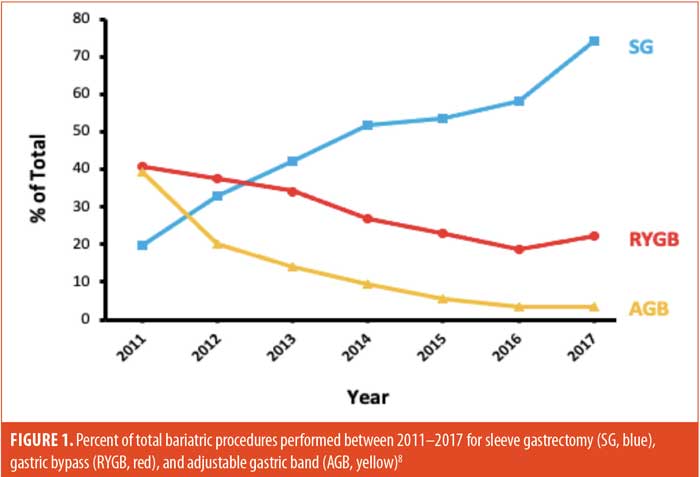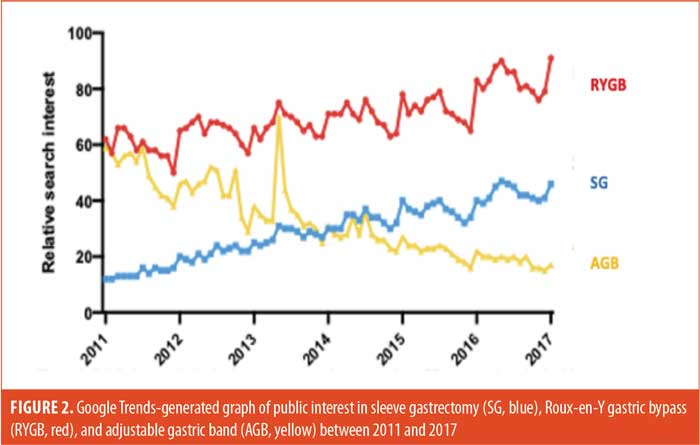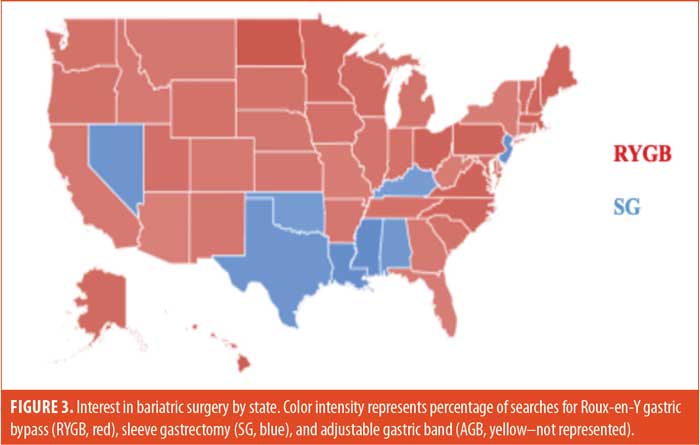Google Trends in Bariatric Surgery: A Disconnect Between Public Interest and Surgery Performed

by Nicholas Gonsalves, MD; Joshua Tseng, MD; Yufei Chen, MD; and Maggie Diller, MD
All authors are with the Division of Minimally Invasive Surgery and Endocrine Surgery, Department of Surgery, Cedars-Sinai Medical Center in Los Angeles, California.
Funding: No funding was provided for this article.
Disclosures: The authors have no conflicts of interest relevant to this article.
Bariatric Times. 2023;20(7–12):24–27.
Abstract
Economists utilize Google Trends (GT) to predict present economic activity, a term called nowcasting. Here, GT was used to explore the relationship between current trends in public interest and rates of bariatric operations performed in the United States (US). Public interest search topics, limited to the US, from 2011 to 2017, including “bariatric surgery,” “gastric bypass surgery,” “sleeve gastrectomy,” and “adjustable gastric band,” were analyzed using GT. Relative search interest was compared between surgical type, with a subsequent comparison analysis to published bariatric surgery numbers in the US. The rate of sleeve gastrectomy increased from 19.8 to 74.3 percent (ptrend<0.001). The rate of gastric bypass and gastric band fell from 40.8 to 22.3 percent (ptrend<0.001) and 39.4 to 3.5 percent (ptrend<0.001), respectively. Relative search interest in sleeve gastrectomy rose from 9 to 33.8 percent. Relative interest in gastric bypass rose from 46.6 to 61.7 percent, and relative interest in gastric band fell from 44.4 to 9.8 percent. A comparison of trends between search proportions and operations performed demonstrated a significant difference in the trends for gastric bypass (p=0.01). There was no significant difference in trends for sleeve gastrectomy (p=0.99) or gastric band (p=0.15). There exists a disconnect between public interest and the current surgical environment. The reasons underlying this discrepancy are not fully elucidated and highlight an additional investigative opportunity to explore the causative factors driving these results.
Keywords: Google Trends, bariatric surgery, gastric bypass, sleeve gastrectomy, adjustable gastric band
Epidemiologists predict that the national obesity epidemic in the United States (US) will continue to worsen in upcoming years.1 Based on current trends, over half of all US adults will have obesity by 2030. Nearly a quarter of all adults will have severe obesity, and severe obesity will become the most common body mass index (BMI) category among women, non-Hispanic Black adults, and low-income adults.2 Although diet modification, lifestyle changes, and medications are viable options for weight loss, bariatric surgery remains the most efficacious treatment for morbid obesity.3
Google Trends (GT; Google; Mountain View, California, US), a web-based tool to gauge population interest, offers insight into regional, national, and global trends for multiple surgical subspecialties.4,5 GT is not only useful as a tool to examine public interest trends in bariatric surgery, but also provides sociocultural and political perspectives on weight loss surgery, policy change, and insurance guidelines.6,7 A recent analysis using GT demonstrated a direct correlation between the increasing prevalence of obesity and the number of Google searches related to bariatric surgery.5 However, the existing literature fails to expand upon this finding, and the relationship between public interest and current national trends in bariatric surgery is not known. We investigated whether GT searches reflect the types of bariatric surgeries actually performed in the US. Here, we utilized GT to investigate public interest in the type and number of bariatric surgeries performed in the US.
Methods
GT is a search analysis tool that provides data on the relative popularity of search terms entered into Google’s search engine. GT was used to analyze the following search terms in the US from 2011 to 2017: “bariatric surgery,” “gastric bypass surgery,” “sleeve gastrectomy,” and “adjustable gastric band.” Search interest was assessed using the Relative Search Interest (RSI), which represents search interest relative to the highest point on the chart for the given region and time. For example, a value of 100 is the peak popularity for the term, and a value of 50 means that the term is half as popular as the peak popularity for the term. These data were compared to recently published bariatric surgery numbers in the US from the American Society for Metabolic and Bariatric Surgery (ASMBS).8 Trend analysis was performed within groups using an extension of the Wilcoxon rank-sum test and between groups using a Chi-squared test on proportions.
Results
As a proportion of total cases, sleeve gastrectomy increased from 19.8 percent in 2011 to 74.3 percent in 2017 (ptrend<0.001), while gastric bypass and adjustable gastric band fell from 40.8 to 22.3 percent (ptrend<0.001) and 39.4 to 3.5 percent (ptrend<0.001), respectively (Figure 1).

RSI for the term “bariatric surgery” increased from 72 in 2011 to 95 in 2017 (ptrend<0.001), mirroring a rise in obesity rates in the US. In a subregional analysis, seven of the top 10 states with the most interest in this search query were in the top 10 for rates of adult obesity in the US. In the same time period, RSI for the term “sleeve gastrectomy” increased from 9 to 33.8, RSI for “gastric bypass” increased from 46.6 to 61.7, and RSI for “adjustable gastric band” decreased from 44.4 to 9.8 (Figure 2). Figure 3 shows interest in type of bariatric surgery by US state.


When comparing search proportion trends to operations performed trends, there was a significant difference in the trends for gastric bypass (p=0.01), but there was no significant difference in trends for sleeve gastrectomy (p=0.99) or gastric band (p=0.15).
Discussion
This study investigated the relationship between the US population’s interest in bariatric surgery (quantified by RSI) and the procedures patients received on a national aggregate level. Interest in sleeve gastrectomy, gastric bypass, and bariatric surgery increased over time, mirroring the rise in obesity rates in the US. Although RSI for gastric bypass was higher than sleeve gastrectomy at every point in time, sleeve gastrectomy became the predominant metabolic procedure performed in 2017. The stark contrast between prospective patient’s search interests and the procedures they undergo highlights the importance of investigating how patients make informed decisions in their care.
In the digital age, patients spend time educating themselves using internet resources. A recent survey found that 35 percent of US adults sought medical information online prior to seeking advice from a healthcare professional, and 77 percent of these online health seekers started their search through a search engine, such as Google.9 Furthermore, only 46 percent of online health seekers followed up with a medical professional, while 35 percent did not visit a clinician. There are multiple reasons why patients seek information from the internet instead of a physician. Studies suggest two major factors: limited doctor consultation time and barriers to accessing professional health services.10 Study participants found web-based health information appealing due to its convenience.10,11 However, they were also wary of its lack of credibility and individualized advice. Finally, online health sources may contain medical jargon and higher-than-recommended reading levels for the general public.12,13
This shift toward online self-education has major implications in bariatric surgery. Our GT analysis showed a significant increase in interest in bariatric surgery, sleeve gastrectomy, and gastric bypass over time. Of note, the RSI was higher for gastric bypass than sleeve gastrectomy. Although initial patient interest leans toward gastric bypass, at the conclusion of information acquisition, most patients undergo sleeve gastrectomy over other types of bariatric surgery. It is possible that after individualized consultation with a surgeon, patients change their minds and make a more informed decision. Although patients may initially seek a gastric bypass over a sleeve gastrectomy due to higher excess weight loss, lower risk of postoperative gastroesophageal reflux disease (GERD), or higher rates of recent Type 2 diabetes remission,14–17 most studies find no statistically significant difference in overall weight loss between the two procedures, and a sleeve gastrectomy is a technically less complex operation.15,17 It has also been shown in a large cohort of commercially insured patients that sleeve gastrectomy has fewer complications than gastric bypass.18
One solution to this complex issue of online self-education is for healthcare providers to adapt to information behaviors in the modern era. Previous work has proposed a system that provides an instant, automated response from healthcare providers to questions posed by health seekers that would take the place of traditional community-generated forums.19 Next steps in investigating this phenomenon should include utilizing GT to potentially bring forth more discrepancies in healthcare to foster further discussion. The US National Cancer Institute has encouraged studying population trends, stating “behavioral measures are needed in the health care environment…and in public health planning, in which national indices of progress on behavioral measures could guide policy and communication planning.”20 Knowledge of search patterns will help inform providers so they can capitalize on the valuable information obtained via the internet, but also correct misconceptions that are commonly encountered when patients use search engines to inform their decisions and guide their care. Interestingly, when searching the key phrases of this study through Google, the ASMBS website was on the first page, but was not the top result, and the order of the links can change depending on where the search is conducted. The onus is on physicians to understand the information patients are seeking and how they interpret the information, and then to have a thoughtful discussion with patients based on their preferences, as well as national trends and evolving standards of care.
Limitations. There are several limitations to this study. The study is an observational study of a single search engine, Google. The surgical phrases used do not encompass all searched information on bariatric surgery during that time period. GT cannot determine what links patients click after their initial search, thus limiting our knowledge on what additional online self-education information influences their decisions. Also, a GT search of common benefits, risks, and complications associated with these operations was not performed. Furthermore, our GT search is limited to English queries in the US at the metropolitan and state level. This methodology excludes the vast majority of non-English speaking individuals, the rural community, and other countries, and is thus not representative of the entire population.
Conclusion
Based on GT data, there exists a disconnect between public interest and the current bariatric surgical environment. The reasons underlying this discrepancy are not fully elucidated and highlight an additional investigative opportunity to explore the causative factors driving these results.
References
- Finkelstein EA, Khavjou OA, Thompson H, et al. Obesity and severe obesity forecasts through 2030. Am J Prev Med. 2012;42(6):563–570.
- Ward ZJ, Bleich SN, Cradock AL, et al. Projected US state-level prevalence of adult obesity and severe obesity. N Engl J Med. 2019;381(25):2440–2450.
- Gloy VL, Briel M, Bhatt DL, et al. Bariatric surgery versus non-surgical treatment for obesity: a systematic review and meta-analysis of randomised controlled trials. BMJ. 2013;347:f5934.
- Tian WM, Rames J, Blau J, et al. Google Trends highlights a breast implant paradigm shift. Plast Reconstr Surg. 2022;149(4):833e–835e.
- Aleman R, Milla-Matute C, Fonseca Mora M, et al. Google Trends as a resource for bariatric education: what do patients want to know? Surg Obes Relat Dis. 2020;16(12):1948–1953.
- Rahiri JL, Barazanchi A, Furukawa S, et al. Using Google Trends to explore the New Zealand public’s interest in bariatric surgery. ANZ J Surg. 2018;88(12):1274–1278.
- Linkov F, Bovbjerg DH, Freese KE, et al. Bariatric surgery interest around the world: what Google Trends can teach us. Surg Obes Relat Dis. 2014;10(3):533–538.
- American Society for Metabolic and Bariatric Surgery. Estimate of bariatric surgery numbers, 2011–2019. Jun 2022. https://asmbs.org/resources/estimate-of-bariatric-surgery-numbers. Accessed 7 Nov 2022.
- Fox S, Duggan M. Health Online 2013. Pew Research Center. 15 Jan 2013. https://www.pewinternet.org/wp-content/uploads/sites/9/media/Files/Reports/PIP_HealthOnline.pdf. Accessed 7 Nov 2022.
- Chu JT, Wang MP, Shen C, et al. How, when and why people seek health information online: qualitative study in Hong Kong. Interact J Med Res. 2017;6(2):e24.
- Cline RJW, Haynes KM. Consumer health information seeking on the Internet: the state of the art. Health Educ Res. 2001;16(6):671–692.
- Dy CJ, Taylor SA, Patel RM, et al. The effect of search term on the quality and accuracy of online information regarding distal radius fractures. J Hand Surg Am. 2012:37(9):1881–1887.
- Greywoode J, Bluman E, Spiegal J, Boon M. Readability analysis of patient information on the American Academy of Otolaryngology–Head and Neck Surgery website. Otolaryngol Head Neck Surg. 2009;141(5):555–558.
- McTigue KM, Wellman R, Nauman E, et al. Comparing the 5-year diabetes outcomes of sleeve gastrectomy and gastric bypass: the National Patient-Centered Clinical Research Network (PCORNet) Bariatric Study. JAMA Surg. 2020;155(5):e200087–e200087.
- Peterli R, Wölnerhanssen BK, Peters T, et al. Effect of laparoscopic sleeve gastrectomy vs laparoscopic Roux-en-Y gastric bypass on weight loss in patients with morbid obesity: the SM-BOSS randomized clinical trial. JAMA. 2018;319(3):255–265.
- Hofsø D, Fatima F, Borgeraas H, et al, Gastric bypass versus sleeve gastrectomy in patients with Type 2 diabetes (Oseberg): a single-centre, triple-blind, randomised controlled trial. Lancet Diabetes Endocrinol. 2019;7(12):912–924.
- Salminen P, Helmiö M, Ovaska J, et al. Effect of laparoscopic sleeve gastrectomy vs laparoscopic Roux-en-Y gastric bypass on weight loss at 5 years among patients with morbid obesity: the SLEEVEPASS randomized clinical trial. JAMA. 2018;319(3):241–254.
- Chhabra KR, Telem DA, Chao GF, et al. Comparative safety of sleeve gastrectomy and gastric bypass: an instrumental variables approach. Ann Surg. 2022;275(3):539–545.
- Kumar VM, Keerthana A, Madhumitha M, et al. Sanative chatbot for health seekers. Int J Eng Comput Sci. 2016;5(3):16022–16025.
- Eysenbach G. Infodemiology and infoveillance: framework for an emerging set of public health informatics methods to analyze search, communication and publication behavior on the internet. J Med Internet Res. 2009;11(1):e11.
Category: Brief Report, Current Issue



